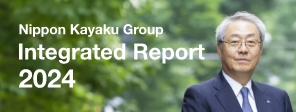Our efforts towards realizing a sustainable society have seen us weave together our Nippon Kayaku Charter of Conduct and Code of Conduct, our Purchasing Principles, our Basic Purchasing Policy and our Responsible Mineral Procurement Policy into a Sustainable Purchasing Guidebook, and promote affirmation of such guidelines from a large number of suppliers.
With consideration given to respect for human rights, environmental conservation, worker safety and health, legal compliance, and fair trading, we are teaming up with our suppliers to promote sustainable procurement across the entire supply chain, spanning R&D, raw material procurement, manufacturing, selling and distribution.
We use briefing sessions, everyday communication and regular business conversations to enhance supplier understanding of our sustainable procurement drives, and periodically ask suppliers to sign pledges to comply with the terms and conditions of our Sustainable Procurement Guidebook. FY2024 has seen us issue every new supplier (raw materials manufacturer) with a copy of our Sustainable Procurement Guidebook, along with a relevant survey, whose results we have now collated in order to confirm the situation on the ground. From now on, we will continue working towards achieving a sustainable society with a supply chain that fulfils its social responsibilities, and towards becoming a familiar, much-loved presence in the eyes of our customers.
Conducting Sustainable Procurement Questionnaire Surveys
Nippon Kayaku has conducted a Sustainable Procurement Survey of all new and existing suppliers to confirm the status of socially and environmentally-focused initiatives. FY2023 saw us survey the suppliers who made up the top 90% of our raw materials purchases in 2021, as well as new suppliers who registered in FY2022 and FY2023, a total of 371 companies. The survey was based on the contents of the Sustainable Procurement Guidebook, and saw us gain the consenting agreement of 338 companies (91%) over the two years spanning FY2022 and FY2023. The survey also enabled us to confirm that 353 company respondents (95%) were not causing negative environmental or social impacts with respect to human rights and worker safety and health. The future will see us continue our joint efforts with suppliers to aim for a sustainable society across the entire supply chain.
Number of Suppliers Evaluated over the Past Two Years, Response Rate and Consenting Rate
|
Number of Suppliers |
Response Rate |
Consenting Rate |
| FY2022-2023 |
371 companies |
95% |
91% |
Main Items on the Sustainable Procurement Survey
| Assessment Points |
Details |
| Human Rights & Labor |
Banning of forced labor and child labor, appropriate management of working hours, appropriate payment of wages, humane treatment of employees, eradication of discrimination and harrassment, freedom of association |
| Safety and Health |
Workplace safety, emergency preparedness, prevention of industrial hazards and sicknesses, industrial hygiene, due consideration given to physically-challenging labor, machine safety measures, provision of sanitation facilities/ food/dwellings, health and safety communication |
| Environment |
Environmental permissions and reports, efficient use of resources and waste management, anti-pollution and resource reduction, management of hazardous materials, solid waste management and reduction, exhaust gas pre-processing, restrictions on materials, water management, reduced energy consumption and greenhouse gas emissions, biodiversity conservation |
| Ethics |
Business integrity, eradication of unjustifiable profits, appropriate information disclosure, respect for intellectual property rights, fair business/fair advertising/fair competition, ID protection and prevention of retaliation, responsible mineral procurement, animal welfare, privacy protection |
| Management System |
Corporate commitments, managerial accountability and responsbility, legal and customer requirements, appropriate import and export management, risk evaluation and management, improvement objectives, training, communication, worker feedback/participation/complaints responses, audits and assessments, processes for corrective measures, creation and maintenance of a documenting and registration system, supplier responsibility |
| Product Quality and Safety |
Guaranteeing product safety, product quality management, provision of accurate product and service information |
| Information Security |
Defense against cyber attacks, protection of personal information, prevention of confidential information leaks |
| BCP |
Fixing a Business Continuity Plan |
Audits of our Suppliers
The Nippon Kayaku Group conducts annual audits of suppliers with the aim of promoting and properly achieving sustainable procurement. These audits see the manager of every Nippon Kayaku plant check and assess their suppliers against various management criteria with respect to plant facilities, processes, health and safety, production and more. We conducted 101 supplier audits in FY2023 (and, as of June 2024, are still awaiting document responses from four of them). Having confirmed information and points of concern in relation to these audits, we provided feedback and demanded improvements from the suppliers in question, but found no instances of serious violations.
Our Fine Chemicals Business Unit is referring to the RBA Code of Conduct when confirming the status of supplier initiatives in the five key areas of: Labor (Human Rights), Safety & Health, Environment, Ethics and Management Systems. FY2023 saw 71 supplier companies undergo such an audit (16 onsite, 1 online, and 54 via document submission as of June 30th 2024 – with 4 companies yet to respond).
Business Continuity Planning (BCP): Procurement Initiatives
Nippon Kayaku regularly works to gather information on supply chain hazards and accidents, and immediately share such information through internal company databases. It also seeks to promptly pick up the charts of the raw materials procured from the relevant country of origin or manufacturer, and thereby confirm the impact on stocks, procurement, factory operation restarts and manufacturing. Although one BCP measure has seen us switch to purchasing many items from multiple suppliers, we still need to strengthen initiatives in order to respond to all manner of situations.



